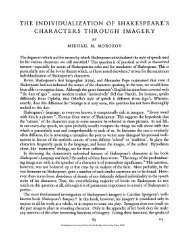changing places in 'othello' - Fairfield High School English Department
changing places in 'othello' - Fairfield High School English Department
changing places in 'othello' - Fairfield High School English Department
Create successful ePaper yourself
Turn your PDF publications into a flip-book with our unique Google optimized e-Paper software.
counter-movement of redemption. The ' foul and<br />
violent tempest' which parts the ships of Cassio and<br />
the Moor (2.1.34) clearly anticipates the storm of<br />
passion which will part their friendship for ever; the<br />
voyage itself parts Desdemona and Othello before<br />
their marriage can be consummated, and here too<br />
the tempest symbolically announces a division<br />
which will be resolved only <strong>in</strong> the perverted<br />
consummation of act 5.1 As so often <strong>in</strong> Shakespeare,<br />
the sea-voyage amounts to a rite of passage: it is as<br />
though some fatal boundary had been crossed - from<br />
this bourn no traveller returns.<br />
Venice is the city of the play, its metropolitan<br />
centre; but the civilization it represents proves, on<br />
closer <strong>in</strong>spection, to be no more ideal than that of its<br />
counterpart <strong>in</strong> The Merchant of Venice. Iago's racial<br />
slurs and Brabantio's answer<strong>in</strong>g outrage make it<br />
pla<strong>in</strong> from the beg<strong>in</strong>n<strong>in</strong>g that, beneath its<br />
ceremonious courtesies, Shakespeare's Venice is a<br />
society capable of treat<strong>in</strong>g any stranger, any ethnic<br />
outsider with the same calculat<strong>in</strong>g cruelty it meted<br />
out to Shylock. 'There's many a beast then <strong>in</strong> a<br />
populous city, / And many a civil monster', Iago<br />
tells Othello <strong>in</strong> a characteristically veiled sarcasm<br />
(4.1.63—4): the remark is doubly Janus-faced, for<br />
beyond its glance at the supposed horn<strong>in</strong>g of Othello<br />
by the urbane monsters Cassio and Desdemona, it<br />
means to po<strong>in</strong>t at the Venetian Moor himself as a<br />
k<strong>in</strong>d of tamed Caliban, a civilized barbarian; while<br />
by a further reach of irony Iago identifies himself<br />
as the true beast of his populous city, the ' Spartan<br />
dog' of Lodovico's f<strong>in</strong>al denunciation (5.2.357), a<br />
barbarous monster beneath his civil guise of honesty.<br />
The fetches of Iago's policy are designed to expose<br />
the essential savagery of his ' stranger' general; but<br />
what they produce is an Othello remade <strong>in</strong> Iago's<br />
own monstrous image.<br />
Like the Venice of The Merchant too, this is a city<br />
whose most humane values can seem compromised<br />
by its mercantile ethics: its language of love, typically,<br />
is ta<strong>in</strong>ted by metaphors of trade, purchase, and<br />
possession. Here women are to men rather as Cyprus<br />
is to Venice and Turkey - objects of competition,<br />
possession, and ' occupation': <strong>in</strong>deed Brabantio's<br />
reply to the Duke's sententious consolation on the<br />
loss of his daughter - 'The robbed that smiles steals<br />
SHAKESPEARE SURVEY<br />
116<br />
Shakespeare Survey Onl<strong>in</strong>e © Cambridge University Press, 2007<br />
someth<strong>in</strong>g from the thief - makes precisely that<br />
equation:<br />
So let the Turk of Cyprus us beguile,<br />
We lose it not so long as we can smile.<br />
(1.3.206, 208-9)<br />
It is natural <strong>in</strong> this world that Iago and Brabantio<br />
should concur <strong>in</strong> see<strong>in</strong>g Desdemona's abduction as,<br />
like Jessica's, the theft of a father's rightful property;<br />
it is perhaps more disturb<strong>in</strong>g to notice that even<br />
Othello's language, for all its rhetorical magnificence,<br />
f<strong>in</strong>ally pictures love as a fabulous treasure, an object<br />
of erotic commerce:<br />
The purchase made, the fruits are to ensue:<br />
The profit's yet to come 'tween me and you.<br />
(2.3.9-10)<br />
However gracefully banter<strong>in</strong>g its expression, the<br />
metaphor here is close to that crass possessiveness<br />
which lies at the root of all jealousy - as we may<br />
quickly feel <strong>in</strong> the more obviously corrupted language<br />
of the temptation scene:<br />
Othello.<br />
What sense had I of her stolen hours of lust ?...<br />
He that is robbed, not want<strong>in</strong>g what is stolen,<br />
Let him not know't, and he's not robbed at all.<br />
(3-3-335, 339-40)<br />
Cruelly enough, the attitude persists even through<br />
Othello's f<strong>in</strong>est agonies of remorse, where his<br />
imag<strong>in</strong>ation seems tormented by the sense of the<br />
1<br />
For a highly persuasive argument that the marriage is<br />
never properly consummated, see T. G. A. Nelson and<br />
Charles Ha<strong>in</strong>es, 'Othello's Unconsummated Marriage',<br />
Essays <strong>in</strong> Criticism, 23 (1983), 1—18. To the mass of<br />
circumstantial detail on which they rest their case, I<br />
would add the suggestive simile with which Iago describes<br />
the fall<strong>in</strong>g out of Cassio and Montano:<br />
Friends all but now, even now,<br />
In quarter and <strong>in</strong> terms like bride and groom<br />
Devest<strong>in</strong>g them for bed: and then but now -<br />
As if some planet had unwitted men -<br />
Swords out, and tilt<strong>in</strong>g one at other's breasts<br />
In opposition bloody. (2.3.173-8)<br />
All citations from Othello are to the edition by Kenneth<br />
Muir (Harmondsworth, 1968).



